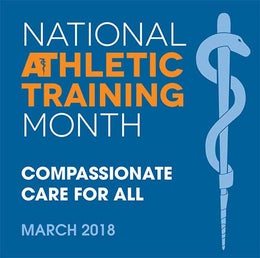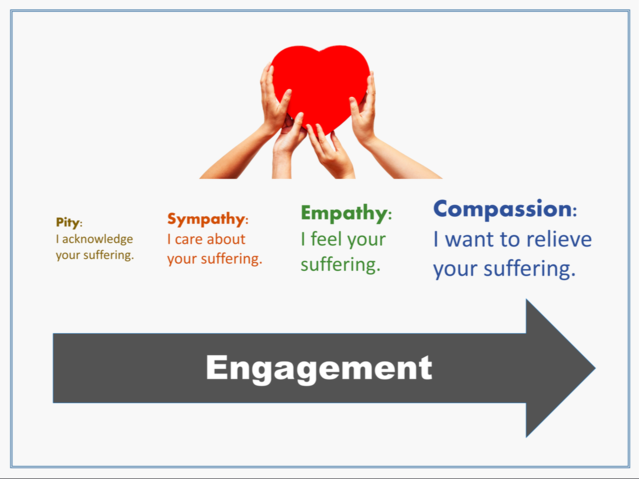
March is National Athletic Training Month. This year’s tagline, “compassionate care for all” highlights how athletic trainers are expected to provide care to patients. The NATA Code of Ethics states, “members shall practice with compassion, respecting the rights, welfare, and dignity of others.” Compassion for others is part of the motivation that pushes us to enter the profession of athletic training and makes us good at what we do. Like many others in the helping professions directing compassion towards ourselves and making time for self-care is secondary to caring for our patients, potentially leading to fatigue and burnout. Knowing this, I want to recognize all the hard work and effort you each put into caring for your “athletes”, no matter where they compete. Whether they are in the military, on the field or at the factory I remind each of you help take care of your patients by taking care of yourself. Self-care is an act compassion for you and an important component of the compassionate care you provide to all your patients.
Compassion, “a willingness to help others, to show empathy by putting one’s self in someone else’s position. When you feel compassion for someone you really want to help.” Compassion is the demonstration of engagement (or desire to relieve suffering) by someone who can acknowledge (pity), care about (sympathy), and feel (empathy) your suffering. [insert image]. Compassion in healthcare has been a highly researched skill. Researchers have tried to develop conceptual models, clarify the impact on patient satisfaction and its impact on healthcare providers. Showing compassion to patients has been shown to improve trust between patients and clinicians, give patients hope and generally improve satisfaction with their overall care.

Self-compassion has been shown to improve resilience and job satisfaction for clinicians, but there is also the risk of compassion fatigue. Compassion fatigue is defined as “state of significant depletion or exhaustion of the practitioner’s store of compassion, resulting from repeated activation over time of empathic and sympathetic responses to pain and distress in patients and in loved ones (Pembroke 2015).” This happens to those who are constantly providing compassion to others while neglecting their own needs. Self-care is an important component of being able to be compassionate in your work. Doing so will decrease the risk of burnout and/or secondary stress and lead to improved patient care over the long term.

Self-care is “any activity we do in deliberately in order to take care of our mental, emotional, and physical health.” Self-care is not selfish, it is self-compassion. It is a necessity in helping minimize the likelihood of compassion fatigue, burnout and physical fatigue in the process of being present for yourself, your family and your patients. Self-care tools vary by person depending on what you consider energizing, but there are some general concepts and tools that many find useful and effective. Tools to support self-care can range from developing mindfulness and meditation skills to learning to say no when asked to take on another task or responsibility beyond your current commitments. Making time to exercise – even just a brief walk during your work day can give you the time you need to recharge.

I encourage each of you to complete the Professsional Quality of Life Test (ProQoL) to better understand your levelop of compassion fatigue and what you can do about it. While not designed with athletic trainers specifically in mind, I have little doubt that compassion fatigue affects athetic trainers in the same ways it affects others in the helping professions - physicians, nurses, and mental health professionals among others. Burnout in athletic training professionals and athletic training students has been studied for years, but it is time to progress beyond just burnout to a broader understanding of compassion fatigue and how it impacts athletic trainers and our patients.
Further reading:
Incidence of compassion fatigue in athletic trainers*
*This resource is highly recommended - includes instructions on completing an assessment to better understand your personal situation.
Compassion fatigue resiliency training
Mindfulness-based stress reduction
Disclaimer: The content contained in this blog is for informational purposes only. The content is not intended to be a substitute for professional medical advice, diagnosis or treatment. Always seek the advice of your physician, athletic trainer, or other qualified health provider with any questions you may have regarding a medical condition. If you think you may have a medical emergency, call your doctor or 911 immediately.

